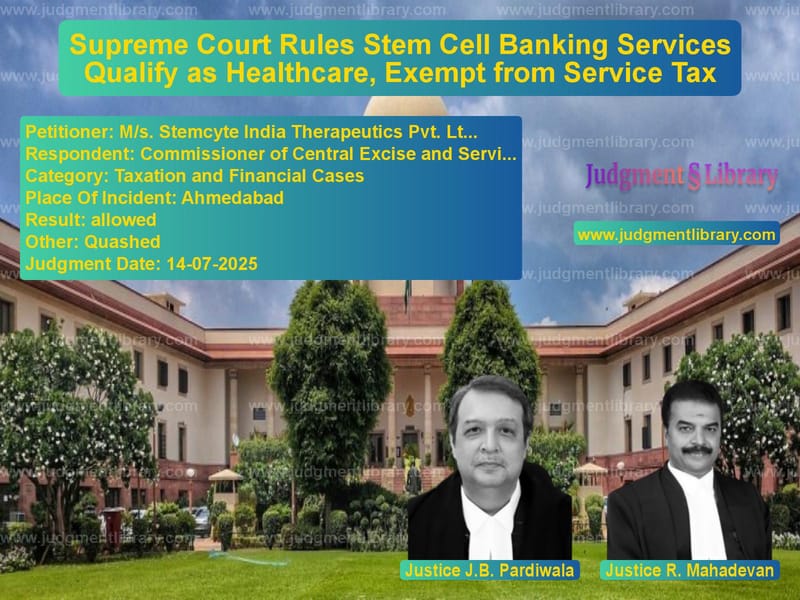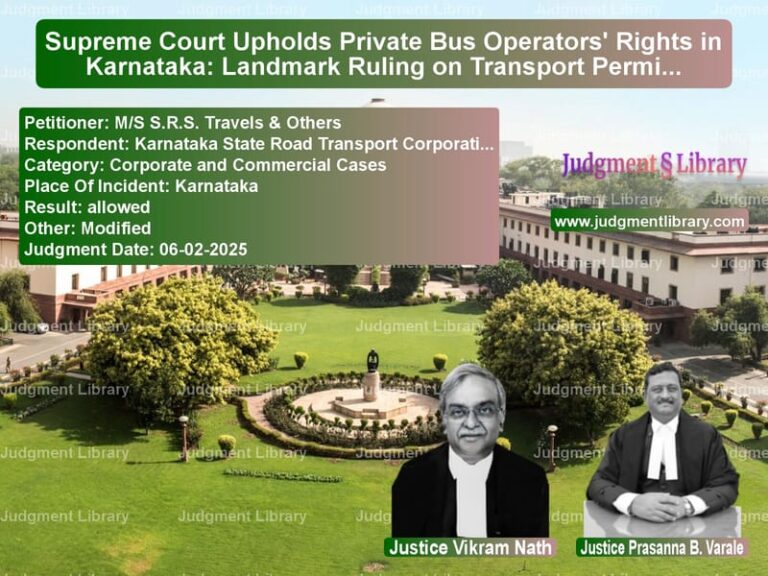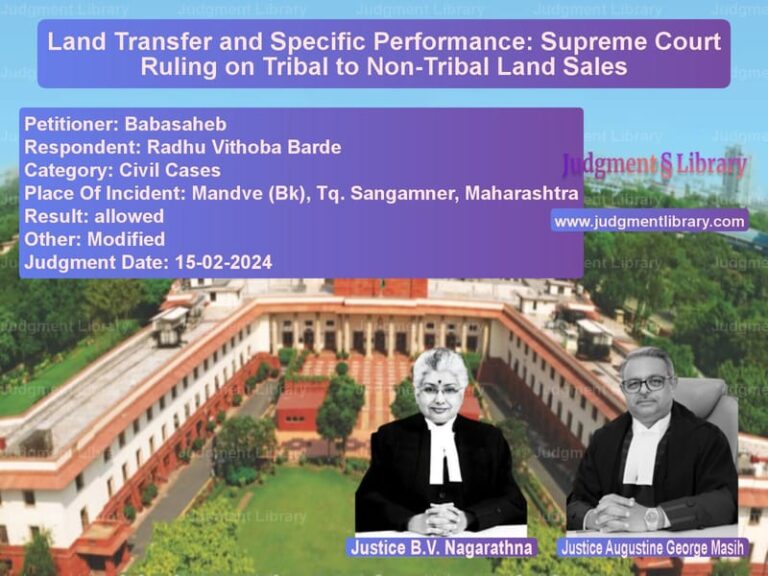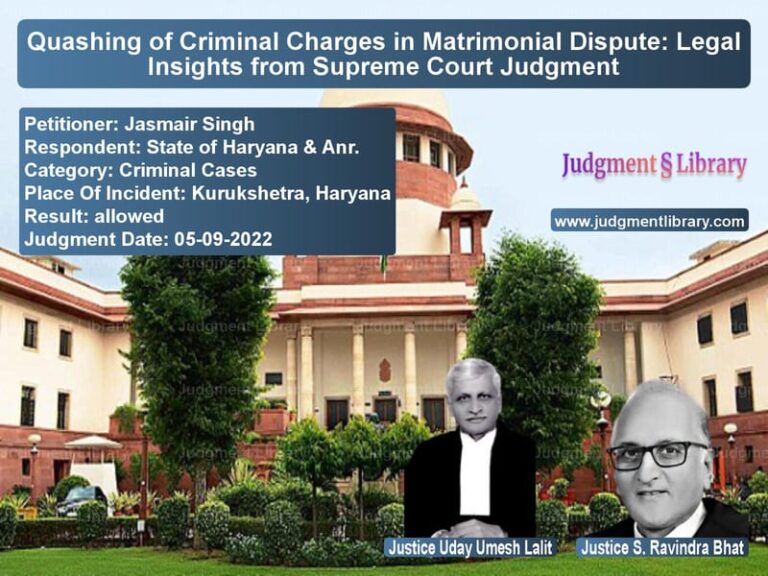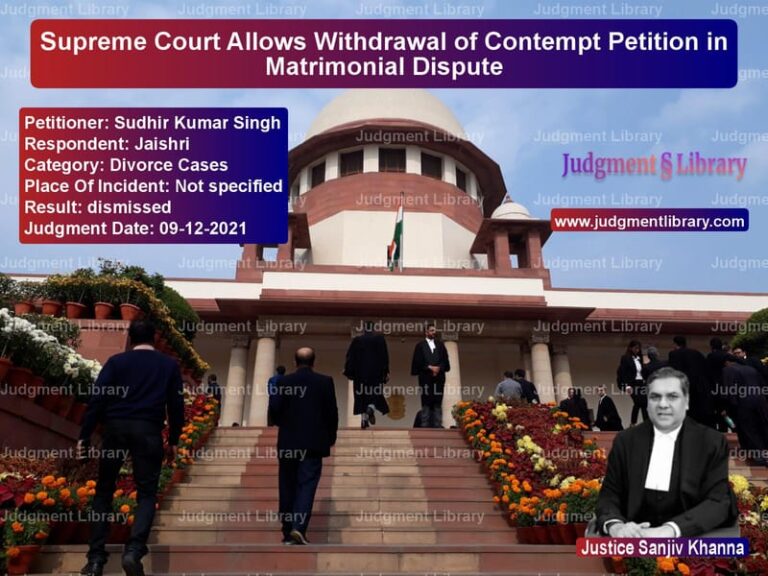Supreme Court Rules Stem Cell Banking Services Qualify as Healthcare, Exempt from Service Tax
In a landmark judgment that brings clarity to the taxation of emerging medical technologies, the Supreme Court has ruled that stem cell banking services qualify as healthcare services and are exempt from service tax. The case involved M/s. Stemcyte India Therapeutics Pvt. Ltd., a joint venture company engaged in the collection, processing, testing, and storage of umbilical cord blood stem cells for therapeutic applications.
The legal dispute centered around whether the company’s services during the period from July 1, 2012, to February 16, 2014, fell within the definition of “Healthcare Services” under Notification No. 25/2012-ST dated June 20, 2012, which provided exemption from service tax. The tax authorities had demanded Rs. 2.07 crore in service tax along with interest and penalties, arguing that stem cell banking services were only specifically exempted from February 17, 2014, onward through a separate notification.
The appellant company, represented by senior counsel, argued that “the CESTAT failed to properly consider the various documents, expert opinions, and submissions placed on record. These included the Office Memorandum No.X.11035/41/2012-DFQC (Pt.) dated 22.05.2013 issued by the Ministry of Health and Family Welfare, Government of India, clarifying that the services rendered by the appellant – relating to enrolment, collection, processing, and storage of umbilical cord blood stem cells – fall within the ambit of ‘Healthcare Services'”.
The appellant further contended that “the exemption under Entry 2 is broad and does not distinguish between types of illnesses based on their frequency or severity. The CESTAT erred in narrowly interpreting the term ‘Healthcare Services’ holding that although stem cells stored and supplied by the appellant are used for treatment of grave illnesses, these would not qualify as health care services as they are not used for treatment of regular illnesses”.
On the other side, the respondent tax authorities, represented by the Additional Solicitor General, argued that “the services provided by the appellant cannot be classified as falling within the ambit of ‘Healthcare Services by clinical establishments’. Therefore, as per clause 2(t) of Notification No. 25/2012-ST, the activities of enrolment, collection, processing, and storage of umbilical cord blood stem cells are not covered under the said notification for exemption”.
The respondents maintained that “the exemption for the appellant’s services was specifically introduced only by Notification No. 4/2014-ST dated 17.02.2014 through insertion of Entry 2A. Hence, during the period from 01.07.2012 to 16.02.2014, the appellant’s services were neither covered under the Negative List nor exempted by Notification No. 25/2012-ST and they are chargeable to service tax”.
Court’s Analysis on Limitation Period
The Supreme Court first addressed the issue of whether the show cause notice issued by the tax department was time-barred. The disputed period was from July 1, 2012, to February 16, 2014, but the show cause notice was issued only on July 28, 2017 – well beyond the ordinary one-year limitation period.
The Court noted that “It is evident from the communication dated 02.12.2013 issued by the Deputy Commissioner of Central Excise, Ahmedabad-III, directing the appellant to furnish the documents relating to their activities, that the department was already aware of the nature of the appellant’s operations as early as in 2013. Despite such awareness, the department issued the show cause notice after an inordinate delay, well beyond the ordinary period of limitation”.
The Court emphasized that “There is nothing on record to suggest that the appellant suppressed any material facts. On the contrary, they responded promptly to departmental communications and even deposited a sum of Rs. 40,00,000/- during the investigation. There was no allegation or evidence of fraud, collusion, wilful misstatement, or contravention of statutory provisions with intent to evade tax”.
Citing established legal principles, the Court stated that “It is a settled principle of law that, for the department to invoke the extended period of limitation, there must be an active and deliberate act on the part of the assessee to evade payment of tax. Mere non-payment of tax, without any element of intent or suppression, is not sufficient to attract the extended limitation period”.
Classification as Healthcare Services
The core legal question before the Court was whether stem cell banking services constitute “Healthcare Services” as defined in the exemption notification. The Court examined the definition under Clause 2(t) of Notification No. 25/2012-ST, which defines healthcare services as “any service by way of diagnosis or treatment or care for illness, injury, deformity, abnormality or pregnancy in any recognised system of medicines in India”.
The Court observed that “It is clear that the use of the phrase ‘any service’ gives an expansive scope to the term. Though the terms ‘diagnosis’, ‘treatment’, and ‘care’ are not specifically defined under the Finance Act, 1994, their ordinary meanings (as per Oxford and Black’s Law Dictionaries) include acts like identifying illness causes, curing diseases or injuries, and ensuring well-being or preventive healthcare”.
The Court found that “The appellant’s core activities – collection and preservation of umbilical cord blood (UCB) stem cells – are preventive in nature, with potential curative applications for life-threatening diseases. The processing, testing, cryopreservation, and eventual release for transplantation constitute integral components of healthcare aimed at future diagnosis, treatment, and care”.
Significantly, the Court noted the Ministry of Health and Family Welfare’s Office Memorandum dated May 22, 2013, which explicitly stated that “the services rendered by the Stem Cell Banks are part of healthcare services and hence they may be considered for service tax exemption”.
Clarificatory Nature of Subsequent Notification
The Court addressed the significance of Notification No. 4/2014-ST dated February 17, 2014, which specifically exempted services provided by cord blood banks. While acknowledging that this notification could not be applied retrospectively, the Court held that it was clarificatory in nature.
The Court stated that “In the present case, since we have rendered a finding that stem cell banking services constitute a healthcare service, which was specifically so stated by the notification dated 17.02.2014, the said notification must necessarily be held to be illustrative and clarificatory to that extent. This clarification/specific exemption, coupled with our finding that stem cell banking services fall within the ambit of ‘Healthcare Services’, must necessarily inure to the benefit of the appellant”.
The Court specifically overruled the Madras High Court’s judgment in Life Cell International (P) Ltd. v. Union of India to the extent that it held the 2014 notification was not clarificatory, stating “while we concur with the decision of the Madras High Court to the extent that Notification No. 4/2014-ST cannot be considered to be retrospective, we are of the considered opinion that the said amendment is indeed clarificatory. To this limited extent, the judgment in Life Cell International (P) Ltd. (supra) stands overruled in principle”.
Preventive Healthcare Recognized
The Court made important observations about the nature of healthcare, recognizing that it includes preventive services and is not limited to treatment after illness occurs. The Court cited with approval the Andhra Pradesh High Court’s judgment in M. Satyanarayana Raju Charitable Trust v. UOP, which held that “While allopathic system of medicine is only for diagnosis and treatment of illness, many of the indigenous system of medicines, seek to prevent rather than prescribe”.
The Court emphasized the broad interpretation required for exemption notifications, noting that “While interpreting an exemption clause, liberal interpretation should be imparted to the language thereof, provided no violence is done to the language employed”.
Penalties Set Aside
The Court set aside all penalties imposed on the appellant, finding that “it is evident that the appellant neither suppressed nor concealed any material facts from the Department. On the contrary, they were in constant communications with the Department, seeking clarifications on whether their services were exempt from the levy of service tax”.
The Court further noted that “there is nothing on record to indicate any intent on the part of the appellant to evade payment of service tax. All relevant information and documents were duly disclosed and furnished to the Department. The appellant acted under a bona fide belief that their activities were covered under Entry 2 of the Exemption Notification dated 20.06.2012”.
Final Ruling and Refund Ordered
The Supreme Court allowed the appeals and set aside the impugned order in its entirety. The Court directed that “The deposit of Rs. 40,00,000/- made by the appellant shall be refunded to them within a period of four weeks from the date of receipt of this judgment”.
This judgment provides significant clarity on the tax treatment of advanced medical services and reinforces the principle that healthcare exemptions should be interpreted liberally to include emerging technologies that serve preventive and curative healthcare purposes. The decision acknowledges the evolving nature of medical science and ensures that beneficial exemptions keep pace with technological advancements in healthcare.
Petitioner Name: M/s. Stemcyte India Therapeutics Pvt. Ltd..Respondent Name: Commissioner of Central Excise and Service Tax, Ahmedabad – III.Judgment By: Justice J.B. Pardiwala, Justice R. Mahadevan.Place Of Incident: Ahmedabad.Judgment Date: 14-07-2025.Result: allowed.
Don’t miss out on the full details! Download the complete judgment in PDF format below and gain valuable insights instantly!
Download Judgment: ms.-stemcyte-india-vs-commissioner-of-cent-supreme-court-of-india-judgment-dated-14-07-2025.pdf
Directly Download Judgment: Directly download this Judgment
See all petitions in Tax Refund Disputes
See all petitions in GST Law
See all petitions in Judgment by J.B. Pardiwala
See all petitions in Judgment by R. Mahadevan
See all petitions in allowed
See all petitions in Quashed
See all petitions in supreme court of India judgments July 2025
See all petitions in 2025 judgments
See all posts in Taxation and Financial Cases Category
See all allowed petitions in Taxation and Financial Cases Category
See all Dismissed petitions in Taxation and Financial Cases Category
See all partially allowed petitions in Taxation and Financial Cases Category

